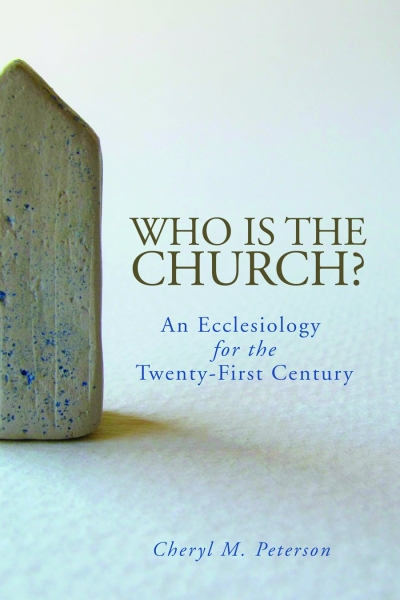Many congregations today are beset by fears, whether over loss of members and money, or of irrelevancy in an increasingly pluralistic society. To counter this, many congregations focus on strategy and purpose—what churches "do"—but Cheryl Peterson submits that mainline churches need to focus instead on "what" or "who" they are—to reclaim a theological, rather than sociological, understanding of themselves.
To do this, she places the questions of the church's identity and mission into a conversation with the primary ecclesiological paradigms of the past century: the neo-Reformation concept of the church as a "word event" and the ecumenical paradigms of the church as "communion." She argues that these two paradigms assume a context of cultural Christendom that no longer exists—focused on the church that is gathered—rather than the missional church that is sent out.
Peterson suggests instead that we understand the church as a people created by the Spirit to be a community, and that we must claim a narrative method to explore the church's identity—specifically, the story of the church's origin in the Acts of the Apostles. Finally, here is a way of thinking of church that reconciles the best of competing models of church for the future of mainline Protestant theology.
To do this, she places the questions of the church's identity and mission into a conversation with the primary ecclesiological paradigms of the past century: the neo-Reformation concept of the church as a "word event" and the ecumenical paradigms of the church as "communion." She argues that these two paradigms assume a context of cultural Christendom that no longer exists—focused on the church that is gathered—rather than the missional church that is sent out.
Peterson suggests instead that we understand the church as a people created by the Spirit to be a community, and that we must claim a narrative method to explore the church's identity—specifically, the story of the church's origin in the Acts of the Apostles. Finally, here is a way of thinking of church that reconciles the best of competing models of church for the future of mainline Protestant theology.
- Publisher Fortress Press
- Format Paperback
- ISBN 9780800698812
- eBook ISBN 9781451426380
- Dimensions 6 x 9
- Pages 176
- Publication Date May 1, 2013
Endorsements
"Identity is the central question facing the church today, when Christianity is no longer culturally established. Cheryl Peterson offers a robustly theological answer, exploring major ecclesiological paradigms and drawing on rich insights from Scripture. This book represents a vital contribution to a Spirit-shaped understanding of the church for a new era of mission."
—Dwight Zscheile
Luther Seminary
"Cheryl Peterson combines a penetrating analysis of influential Protestant visions of the church in North America with a stimulating constructive alternative that begins with the Spirit to advance a mission-driven ecclesiology for the twenty-first century."
—Bradford Hinze
Fordham University
"Whither the church in a post-Christian, post-denominational era? Peterson dismisses the common question to pose one that concerns neither the church's direction nor its mere survival. For her, the more faithful question addresses identity: Who is the church? In an answer that accounts for North American historical and religious contexts, she develops an ecclesiology that begins with the descent the Spirit in the Book of Acts. Her proposal for the church's identity has narrative display, biblical backing, creedal legitimacy—and the Spirit pulsing throughout."
—Martha Stortz
Augsburg College
—Dwight Zscheile
Luther Seminary
"Cheryl Peterson combines a penetrating analysis of influential Protestant visions of the church in North America with a stimulating constructive alternative that begins with the Spirit to advance a mission-driven ecclesiology for the twenty-first century."
—Bradford Hinze
Fordham University
"Whither the church in a post-Christian, post-denominational era? Peterson dismisses the common question to pose one that concerns neither the church's direction nor its mere survival. For her, the more faithful question addresses identity: Who is the church? In an answer that accounts for North American historical and religious contexts, she develops an ecclesiology that begins with the descent the Spirit in the Book of Acts. Her proposal for the church's identity has narrative display, biblical backing, creedal legitimacy—and the Spirit pulsing throughout."
—Martha Stortz
Augsburg College
